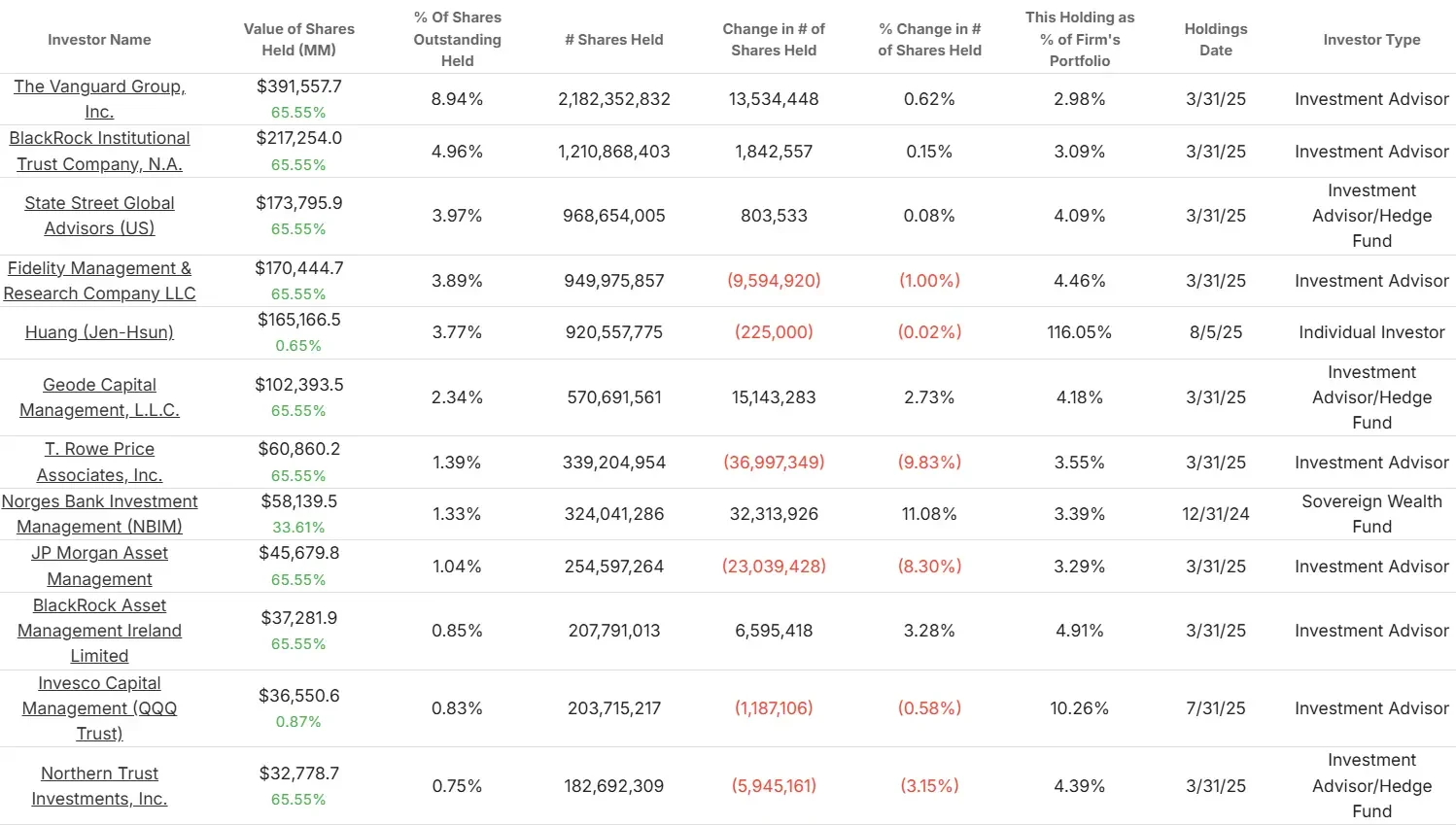Nvidia (NASDAQ: NVDA) has skyrocketed to the top of the stock market in recent years, recently trading around $179 per share with a market cap exceeding $4.3 trillion. Once a niche graphics card manufacturer, Nvidia has evolved into the backbone of the AI revolution and is now one of the most valuable and widely held companies on Earth.
Fueled by explosive demand for AI chips, steady margin expansion, and its dominant position in data centers and machine learning infrastructure, Nvidia has become a must-own name for institutional investors. Its CUDA software platform, strong developer ecosystem, and long-term roadmap for AI, automotive, and data processing give the company competitive advantages that are difficult to replicate.
Once closely tied to founder and CEO Jensen Huang’s personal stake, Nvidia is now a global institutional favorite, widely owned by sovereign wealth funds, retirement systems, and hedge funds alike. Huang still holds around 3.77% of the company, but the vast majority of Nvidia shares are now spread across some of the largest and most influential investors in the world, a testament to its transition from a specialist chipmaker into a critical pillar of the AI economy.
By examining Nvidia’s ownership breakdown, we can see whether the “smart money” is doubling down or quietly trimming its exposure.
Track the top holdings of the world’s smartest investors and top hedge funds. (It’s free) >>>
Who are NVIDIA’s top shareholders?

Nvidia’s stock is heavily owned by large institutional investors, with passive giants leading the way. The Vanguard Group is the top shareholder, holding over 2.18 billion shares, or 8.94% of the company, valued at around $389 billion. BlackRock follows with a 4.96% stake worth approximately $215.8 billion. These positions largely reflect Nvidia’s massive weight in index funds like the S&P 500 and Nasdaq 100.
State Street and Geode Capital also hold meaningful stakes, at 3.97% and 2.34%, respectively. Together, these four firms control over 20% of Nvidia’s outstanding shares, a testament to how deeply embedded the stock is in global portfolios.
CEO Jensen Huang personally owns about 920 million shares, or 3.77% of Nvidia, worth roughly $164 billion. While he has sold shares recently, his ownership remains a key signal of long-term alignment with the business.
Other major shareholders include Fidelity, which trimmed its position by over 9 million shares, and T. Rowe Price and JP Morgan, which reduced their holdings more aggressively. In contrast, Norges Bank, Norway’s sovereign wealth fund, increased its stake by over 32 million shares, while Geode Capital added more than 15 million shares last quarter.
Despite some recent trimming by active managers, Nvidia’s ownership remains dominated by long-term capital. The continued inflows from both passive funds and sovereign wealth signal strong institutional conviction in Nvidia’s role at the center of the AI economy.
See whether NVIDIA’s top shareholders are buying or selling today >>>
NVIDIA’s Recent Insider Trades

Nvidia CEO Jensen Huang sold more than 200,000 shares over three days from July 28 to July 30, 2025, with sale prices ranging between $175.91 and $182.70. Individual transactions ranged from a few thousand shares to over 37,000 shares in a single trade.
While the total value of these sales was substantial, they represent only a small fraction of Huang’s total ownership, which stands at around 920 million shares. His position remains one of the largest insider holdings in any public company.
These sales were filed through routine Form 4 disclosures and appear consistent with Huang’s historical selling pattern. It doesn’t look like there were any signs of unusual activity or shifts in ownership strategy.
Other Nvidia insiders reported no significant trading during this period. Most activity was limited to administrative filings or scheduled grants.
The absence of insider buying may reflect the stock’s elevated valuation, but the continued large personal stake held by Huang signals long-term alignment with the company’s growth and strategic direction.
See recent insider trade data for over 50,000 global stocks (It’s free) >>>
What the Ownership & Insider Trade Data Tell Us
Nvidia’s shareholder base is led by major institutions. Vanguard, BlackRock, and State Street collectively own over 17% of the company, driven largely by Nvidia’s weight in index funds. This level of passive ownership reinforces Nvidia’s position as a core holding across global portfolios.
CEO Jensen Huang still holds around 921 million shares, valued at over 160 billion dollars. His recent sale of around 225,000 shares is small relative to his total stake and appears consistent with past selling patterns, not a shift in sentiment.
Recent moves by active managers show a mix of strategies. Norges Bank and Geode Capital increased their positions, while T. Rowe Price and JP Morgan reduced theirs. These changes likely reflect portfolio rebalancing rather than a change in the outlook for the stock.
Overall, Nvidia continues to attract strong institutional support. Its ownership profile reflects confidence in the company’s long-term leadership in AI and advanced computing.
Wall Street Analysts Are Bullish on These 5 Undervalued Compounders With Market-Beating Potential
TIKR just released a new free report on 5 compounders that appear undervalued, have beaten the market in the past, and could continue to outperform on a 1-5 year timeline based on analysts’ estimates.
Inside, you’ll get a breakdown of 5 high-quality businesses with:
- Strong revenue growth and durable competitive advantages
- Attractive valuations based on forward earnings and expected earnings growth
- Long-term upside potential backed by analyst forecasts and TIKR’s valuation models
These are the kinds of stocks that can deliver massive long-term returns, especially if you catch them while they’re still trading at a discount.
Whether you’re a long-term investor or just looking for great businesses trading below fair value, this report will help you zero in on high-upside opportunities.
Click here to sign up for TIKR and get our full report on 5 undervalued compounders completely free.

